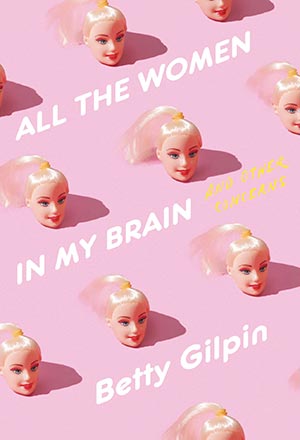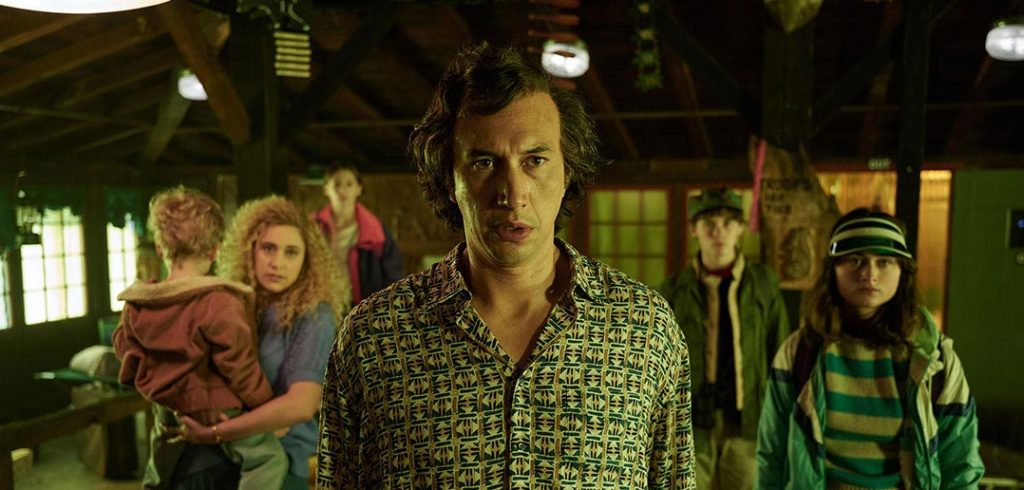White Noise
a film based on the novel by Don DeLillo, FCRH ’58
Don DeLillo’s novel White Noise has aged well since it won a National Book Award in 1985. Darkly funny, it parodies academia and captures the media, technology, and consumer culture of the mid-’80s—what one character calls the “incessant bombardment of information,” much of it unreliable. People commune in the supermarket like it’s a kind of church, and when a train crash releases a cloud of chemicals, the “airborne toxic event” leads to sickness, evacuation, and the threat of ecological disaster. The novel is also about the anxieties and wonders of family life (“the cradle of misinformation”) and the fear of death. And now, it’s a smart, funny Netflix film, faithfully adapted and directed by Noah Baumbach and starring Adam Driver. Driver plays Jack Gladney, a middle-aged professor of Hitler studies who lives with his fourth wife, Babette (Greta Gerwig), and their blended family of four kids. “I’m tentatively scheduled to die,” he tells her, explaining that he’s been exposed to the toxic cloud. She confesses that she has exchanged sex for Dylar, an experimental drug meant to relieve her intense fear of death. How they deal with their fears, their envy and infidelity, is the heart of the film.
—Ryan Stellabotte
Looking for Violet
a podcast by Carmen Borca-Carrillo, FCLC ’20, GSAS ’21
 During the height of the COVID-19 pandemic, Carmen Borca-Carrillo watched a lot of romantic comedies, or rom-coms, with her partner. “What we both figured out pretty quickly was that there really weren’t many lesbian rom-coms,” she said. That’s how Looking for Violet was born. The four-part podcast was her capstone project in the public media master’s degree program at Fordham. In it, she examines why queer love stories are scarcely told in American film comedies. The podcast earned her multiple honors, including a Mark of Excellence Award from the Society of Professional Journalists. “We always say representation in media is important, and I hope that [listeners] take away from it a little bit more of the concrete examples of why it’s important,” said Borca-Carrillo, who is now a junior producer at Wonder Media Network, a women-led podcasting company she said is “dedicated to lifting up underrepresented voices.”
During the height of the COVID-19 pandemic, Carmen Borca-Carrillo watched a lot of romantic comedies, or rom-coms, with her partner. “What we both figured out pretty quickly was that there really weren’t many lesbian rom-coms,” she said. That’s how Looking for Violet was born. The four-part podcast was her capstone project in the public media master’s degree program at Fordham. In it, she examines why queer love stories are scarcely told in American film comedies. The podcast earned her multiple honors, including a Mark of Excellence Award from the Society of Professional Journalists. “We always say representation in media is important, and I hope that [listeners] take away from it a little bit more of the concrete examples of why it’s important,” said Borca-Carrillo, who is now a junior producer at Wonder Media Network, a women-led podcasting company she said is “dedicated to lifting up underrepresented voices.”
—Kelly Prinz, FCRH ’15
All the Women in My Brain
by Betty Gilpin, FCLC ’08
 In 2016, not long before her breakout, Emmy-nominated role as a wrestler in the Netflix series GLOW, Betty Gilpin returned to the Lincoln Center campus to speak with a group of Fordham Theatre students. She said her own student days in the program continue to motivate her. “Especially as a woman, it’s totally different. You’re going to be told things like, ‘Don’t make that weird face when you cry,’ or, ‘Great, just wear more makeup next time,’” she said. But “what you’ve built here is invaluable. You’ve built this ocean of weird to draw on, to love from, that not everybody has.”
In 2016, not long before her breakout, Emmy-nominated role as a wrestler in the Netflix series GLOW, Betty Gilpin returned to the Lincoln Center campus to speak with a group of Fordham Theatre students. She said her own student days in the program continue to motivate her. “Especially as a woman, it’s totally different. You’re going to be told things like, ‘Don’t make that weird face when you cry,’ or, ‘Great, just wear more makeup next time,’” she said. But “what you’ve built here is invaluable. You’ve built this ocean of weird to draw on, to love from, that not everybody has.”
With humor and wit, Gilpin generously shares her “ocean of weird” in this debut essay collection. The title, she writes, is a reference to all the personalities who “take a turn at the wheel” in her brain—some “cowering in sweatpants, some howling plans for revolution.” She skewers the “glossy cringe” of Hollywood and writes about her struggles between ambition and self-doubt. After 15 years as a working actor, she has come to see her experiences as a “perfect allegory for being a woman in this world. Having to cycle through identities to give whoever is in front of you the girl they want.” And she credits the Fordham Theatre program for helping her realize that the craft she chose “wasn’t just sequined escape, it was naked examination.” “Make your demons trade knives for paintbrushes,” she advises young artists. “And like yourself enough to do it out loud.”
—Ryan Stellabotte


